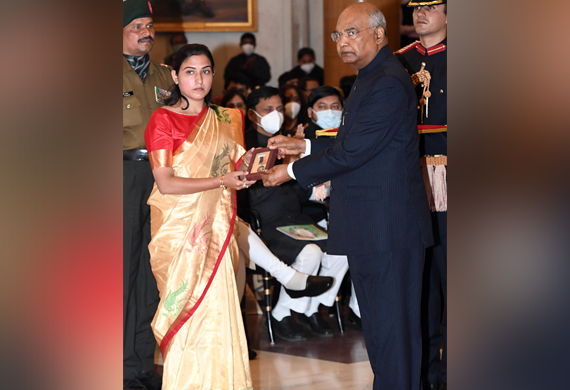
Naik Deepak Singh's Wife Rekha Devi Begins Her Training at Chennai-Based OTA
By: WE Staff | Tuesday, 31 May 2022
Officials familiar with the situation revealed that the wife of Naik Deepak Singh, one of the 20 Galwan braves slain in a battle with the Chinese People's Liberation Army (PLA) in June 2020, has begun training at the Chennai-based Officers Training Academy (OTA).
Rekha Devi, 23, was ready to join the army after passing the Services Selection Board (SSB) interview to join the OTA.
President Ram Nath Kovind posthumously awarded the Vir Chakra (VrC) to Naik Deepak Singh of the 16th Battalion of the Bihar Regiment in November 2021.
After the Param Vir Chakra (PVC) and Maha Vir Chakra (MVC), the VrC is India's third highest wartime military honour.
Rekha will train at the academy for nine months before joining the army as a lieutenant with a short-service commission (SSC). She reported to OTA for training, according to officials. Women officers in the SSC can now be appointed to permanent positions.
Rekha, a Madhya Pradesh native, will join an increasing number of military wives who have chosen to pursue a career in the armed forces after their husbands were martyred.
The wives of soldiers killed in action are excluded from taking the Union Public Service Commission's (USPC) Combined Defence Services Examination, which is required to qualify for the SSB interview. They are eligible to age relaxation as well, though Rekha did not require it. OTA candidates must be between the ages of 19 and 25.
On November 23, 2021, Rekha received her husband's VrC at a ceremony conducted at the Rashtrapati Bhawan. The commanding officer of 16 Bihar, Colonel B Santosh Babu (MVC), Havildar K Palani (VrC) of 81 Field Regiment, Naib Subedar Nuduram Soren (VrC) of 16 Bihar, and Sepoy Gurtej Singh (VrC) of 3 Punjab were all posthumously honoured at the occasion. The only living recipient of the wartime honour for remarkable bravery during the horrific combat at the Galwan Valley was Havildar Tejinder Singh (VrC) of the 3 Medium Regiment.
The scuffle strained the India-China relationship, and the event continues to cast a pall over current talks for the disengagement of competing frontline soldiers along the Line of Actual Control (LAC) in Ladakh, where the Indian Army and PLA have been at odds for more than two years.
During the seven-hour violent combat near Patrol Point-14, Naik Deepak Singh, a medical assistant, saved the lives of more than 30 Indian soldiers by providing prompt care. Around 40 PLA personnel were killed in the conflict, according to Indian estimations, despite China's official claim that just four PLA soldiers died.
Colonel Babu led a squad of 30 soldiers to a spot near PP-14 around 6 p.m. on June 15 to verify if PLA had dismantled certain buildings erected in the area despite an agreement signed on June 6 by top Indian and Chinese military commanders on a disengagement plan to calm escalating border tensions.
However, the squad discovered that a few tents and an observation post were still up and that the Chinese forces had not left PP-14. The Indian troops confronted the Chinese troops, who refused to remove the installations and depart the area, resulting in a violent conflict involving over 600 soldiers at its climax.






